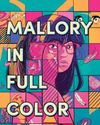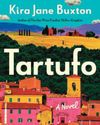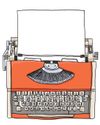
Send up the red flare from the dense, dark forest if you too beat yourself up when you should be writing because sometimes you become so mired in the muck of drafting-even if you've been writing for years and what pours onto the page from the thick scrub is ugly. Or hazy. Or banal. Or all three.
My hands are raised high (in relentless beseeching) with you. You're not alone.
Recently, a reader asked how I steep the propulsive storylines of my novels with such poetry. How do I keep readers turning the page while turning potent phrases and engrossing meditations along the way?
In answer to their question, I reminded myself what it takes to blend evocative, chilling prose with a propulsive plotline.
GET LOST FIRST
We have to get lost in the forests. We have to allow for the ugliness. We have to invite it, even. In the early drafts, your characters may reveal themselves to you in flashes, whispers, or echoes as you chase them through the trees. They might be lost in the mist themselves. It's OK not to see them yet through the fog. That's part of the process. Keep listening and following, and as their voice becomes more distinct, you'll learn how to listen deeper, and their story will begin to unravel before you.
We're often lost in the forest for months before that path out becomes clear, sometimes years. And yet, when we finally find our way through, it feels like redemption. The transformation in my stories often comes from the most vulnerable places because I journey with (and within) my protagonist. We become inseparable at times. And when the story ends, I must wrestle myself free and open my heart to another character who needs me, and I them.
In my newest novel, River Woman, River Demon, this meant following Eva as she tries to uncover the drowning in the river beside her house and its uncanny parallel to her best friend's drowning when they were teenagers:
This story is from the {{IssueName}} edition of {{MagazineName}}.
Start your 7-day Magzter GOLD free trial to access thousands of curated premium stories, and 9,000+ magazines and newspapers.
Already a subscriber ? Sign In
This story is from the {{IssueName}} edition of {{MagazineName}}.
Start your 7-day Magzter GOLD free trial to access thousands of curated premium stories, and 9,000+ magazines and newspapers.
Already a subscriber? Sign In

What Is Your Story Question?
Revision and editing advice to take your first draft to the next level.

Writing for the People We Hope to Become
Elisa Stone Leahy's new middle-grade novel, Mallory in Full Color, tackles the in-between moments of adolescence, when who we are and who we want to become collide.

Creating Community
Whether hot off the presses or on the shelves for years, a good book is worth talking about.

Pat Barker
The Booker Prize-winning author of Regeneration shares the role characters play in developing novel ideas and explains what appeals to her about reimagining mythology.

How to Write in Different Genres
Emiko Jean and Yulin Kuang share tips and strategies for how they successfully write in different genres and mediums.

The Shortest Distance Between Two Points
Ten tips for writing a novel with 100-word stories.

Mayfly Marketing
How to sell your novel in a short-attention-span world.

"You'll be a great essay".
How to write six types of personal essays by finding the funny in your life.

The Idea Factory
Tired of staring at an empty screen? Unlock your inner fiction generator with these surprising inspiration techniques.

Seinfeld Was Right: That's a Story
Use mundane moments from everyday life to create stories that pack a punch.